Looking for a Personalized Diet Plan?
Apple Calories, Nutrition, and Health Benefits

TLDR
- Apples are nutrient-rich, providing dietary fiber, vitamin C, potassium, and antioxidants.
- They are low-calorie and high in fiber, making them a fantastic snack option.
- Their fiber and water content promote fullness, helping to control appetite and reduce calorie intake.
Are you looking for a nutritious and delicious fruit to add to your diet? Look no further than the humble apple! Packed with essential nutrients and widely available, apples make a perfect snack or addition to any meal.
In this article, we’ll explore how apples contribute to better health, along with detailed nutritional information and creative ways to incorporate them into your diet.
Keep reading to discover why apples should be a staple in your grocery basket!
How Many Calories Are in an Apple?
| Apple Serving Size (in grams) | 1 Apple Calories (kcal) | 2 Apple Calories (kcal) | 3 Apple Calories (kcal) | 4 Apple Calories (kcal) |
|---|---|---|---|---|
| 1 Piece (100 grams) | 62 | 124 | 185 | 247 |
Apple nutritional facts
One small apple or 100 grams contains approximately 62 kcal, with 90% of the calories from carbohydrates, 8% from protein, and 2% from fat. Apples are also a great source of potassium and vitamin C and provide vitamin D as well.
Here’s a breakdown of nutrients per 100 grams:
| Nutrient | Amount per 100 grams |
|---|---|
| Energy ( kcal) | 62 |
| Protein (g) | 0.31 |
| Carbohydrates (g) | 14.0 |
| Fat (g) | 0.5 |
| Sugar (g) | 9.8 |
| Dietary fiber (g) | 2.1 |
| Sodium (mg) | 1.0 |
| Potassium (mg) | 100 |
| Calcium (mg) | 5.4 |
| Vitamin C (mg) | 4 |
| Vitamin D (mcg) | 1.8 |
| Vitamin K (mcg) | 2 |
Track your apple calorie intake on the Hint app to stay on top of your nutrition goals.
Apple Benefits
Apple is loaded with vitamins, minerals, and fiber, making it an excellent choice for your health. So, let’s dive in and learn more about the amazing health benefits of this superfood!
1. Reduces risk of chronic diseases
Apples are a good source of fiber, which can help reduce the risk of heart disease, stroke, type 2 diabetes, and some types of cancer.
2. Promotes weight loss
Apples are a low-calorie food that is high in fiber, which can help you feel full and satisfied after eating. This can help you eat less overall and lose weight.
Experiments on animals and humans have shown that the consumption of apples in different forms can cause weight loss in overweight ones.
Results from 5 experiments on humans have revealed that consumption of whole apple or apple juice (240-720 mg/d) in 4-12 weeks by fat people can cause weight loss1.
3. Boosts immunity
Apples are a good source of vitamin C, which is an antioxidant that can help boost the immune system. To know more about which nutrients effectively boost immunity, read our blog on supporting your immunity through nutrition.
4. Blood sugar control
Apples have a low glycemic index, which does not cause rapid spikes in blood sugar levels. This makes them a good choice for managing blood sugar, especially for people with diabetes.
A study looked at how eating an apple before a meal affects blood sugar and insulin levels in people with and without glucose tolerance issues. There were 10 healthy participants with normal glucose tolerance and 9 with impaired glucose tolerance. They all had a meal of white rice and an apple, but some ate the apple before the rice, while others did it the other way around.
For the healthy group, when they ate the apple first, their blood sugar and insulin levels didn't spike as much compared to when they had rice first.
For those with glucose tolerance issues, eating the apple before the rice helped lower the spike in blood sugar.
In simple terms, having an apple before your meal might be a good way to control blood sugar, especially if you have trouble with it2.
5. Improves Heart Health
Cardiovascular disease risk factors including dyslipidemia, endothelial dysfunction, and inflammation are some of the biggest health challenges today.
The fiber and antioxidants in apples are known to be heart-healthy. They can help lower bad cholesterol levels and reduce the risk of heart disease
In a study, it was found that consuming between 100 and 150 g/day of whole apples is associated with a lower CVD risk and decreases in blood pressure, pulse pressure, total cholesterol, low-density lipoprotein cholesterol, and inflammation status as well as increases in HDL-Cholesterol and endothelial function3.
6. Improves Bone Health
Apples contain nutrients like boron, which may contribute to better bone health and lower the risk of osteoporosis.
7. Reduced Risk of Certain Cancers
Some studies suggest that regular apple consumption may be associated with a lower risk of specific cancers, such as lung, colorectal, and breast cancer, due to their antioxidant content4.
8. Improves gut health
The fiber in apples can also help promote a healthy gut microbiome, which is important for overall health.
9. Reduces blood pressure
Apple's are rich in polyphenols, when eaten regularly in a balanced diet, may lower blood pressure, and reduce hypertension and heart risks.
10. Protects brain health
Apples contain antioxidants that may help protect brain cells from damage and reduce the risk of Alzheimer's disease.
Scientific evidence suggests that the high flavonoid content of apple juice and concentrate may help reduce the symptoms of Alzheimer’s disease, laying the groundwork for future controlled clinical trials.
In rodent models, apple extracts high in anthocyanins and flavan-3-ols have been shown to slow the progression of Alzheimer’s disease. This adds to the growing body of evidence supporting the use of polyphenols for cognitive health in the elderly5.
Benefits of Eating Apple at Night
Eating an apple at night can be beneficial for digestion, thanks to its fiber content. It helps keep you full, preventing late-night snacking and promotes better digestion for a restful sleep.
Apple Benefits for Skin
Apples contain antioxidants and vitamin C, which are fantastic for skin health. Regular apple consumption can support collagen production, helping to keep skin youthful and vibrant.
Benefits of Eating Apple on an Empty Stomach
Eating an apple on an empty stomach in the morning may boost metabolism, improve digestion, and provide a quick, natural energy source. The fiber helps regulate blood sugar and keeps you satisfied until your next meal.
Top 10 Recipes of Apple
While incorporating apples into your diet may have some potential benefits, you should be aware of how it is prepared and the resulting nutrition profile of the recipe.
1. Apple Juice

Apple Juice Nutrition
One glass (240 mL) of apple juice has 127 kcal. Out of these calories, 91% is from carbohydrates, 1.9% is from protein, and 7.1% is from fat.
Apple juice is a good source of dietary fiber, vitamin C, and an excellent source of vitamin D.
Apple Juice Benefits
Apple juice is a refreshing drink rich in antioxidants, supporting heart health, immunity, and hydration.
In addition to being hydrating, apple juice provides potassium and antioxidants, which are beneficial for heart health and immunity. Drinking apple juice in moderation can add variety to your diet while supporting hydration.
Eat the fruits in whole form rather than juice for significant health benefits.
2. Apple Lassi Calories
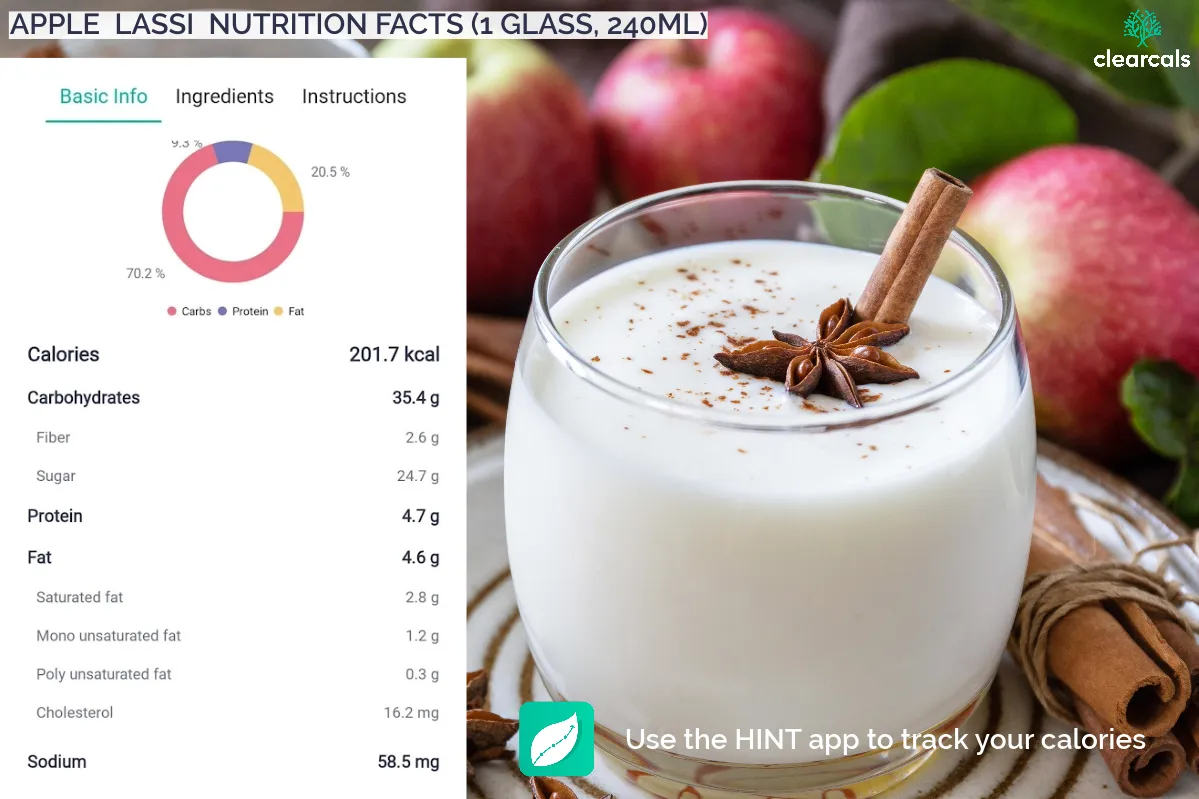
One glass (240 mL) of apple lassi contains 201.7 kcal. Out of this, 70.2% is from carbohydrates, 9.3% is from protein, and 20.5% is from fat.
Apple lassi is a good source of calcium, probiotics, phosphorus, and an excellent source of vitamin D, and vitamin B12. This refreshing drink helps to soothe the digestive system and boosts immunity.
3. Apple Milkshake Calories

One glass (240 mL) of apple milkshake contains 225 kcal. Out of this, 50% is from carbohydrates, 10% is from protein, and 40 % is from fat.
Apple milkshake is a good source of protein, riboflavin, calcium, phosphorus, and selenium, and an excellent source of manganese, vitamin B12, and vitamin D.
Apple Milkshake Benefits
An apple milkshake provides essential nutrients, including protein, calcium, and vitamins, making it a nutritious snack or breakfast option. It’s especially beneficial for bone health and muscle recovery after exercise.
Individuals with diabetes, prediabetes, and insulin resistance should avoid this milkshake as it contains high sugar content.
Apple Smoothie for Weight Loss
Apple smoothies, especially when combined with greens like spinach, are low-calorie and fiber-rich, making them ideal for weight management. The fiber content helps keep you full longer, curbing appetite and reducing overall calorie intake.
4. Apple Dates Smoothie
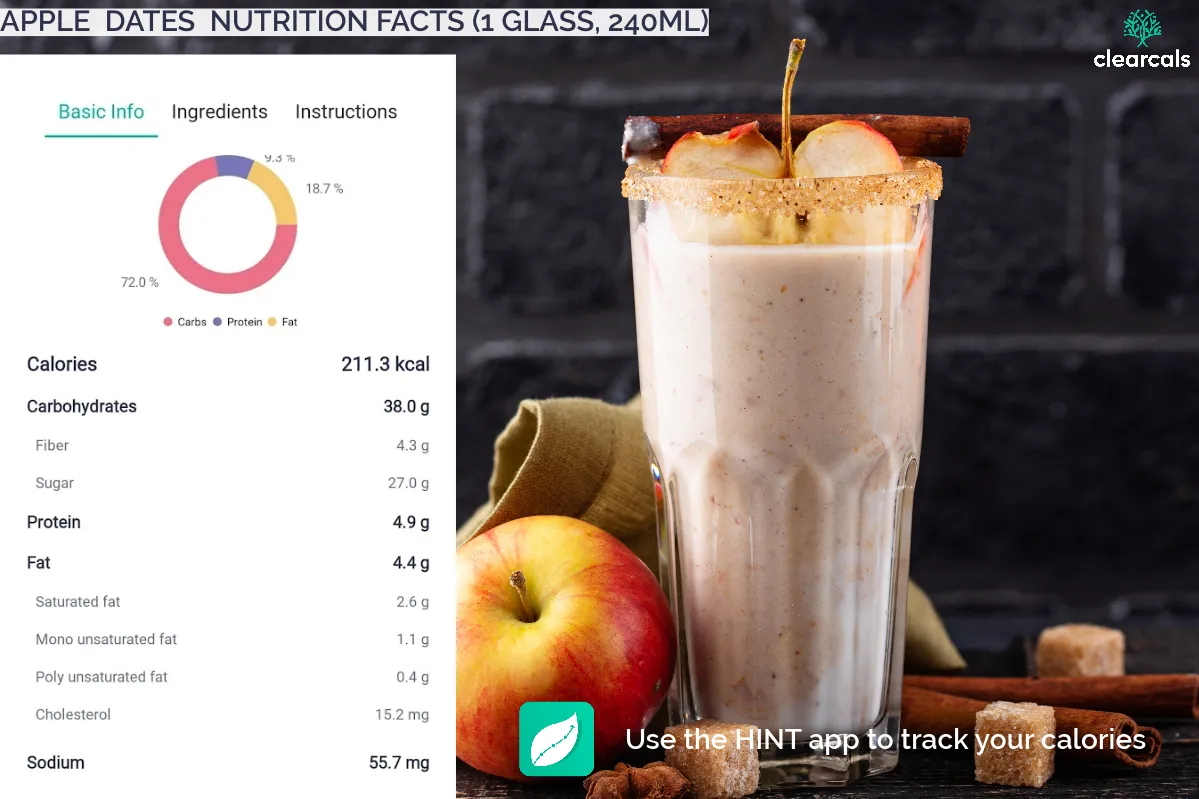
One glass (240 mL) of apple dates smoothie contains 211 kcal. Out of this, 72 % is from carbohydrates, 9 % is from protein, and 19 % is from fat.
Apple dates smoothie is a good source of probiotics, protein, dietary fiber, calcium, phosphorus, copper, potassium, vitamin B12, and an excellent source of vitamin D. One should drink this beverage in moderation as it contains high sugar.
5. Apple Ginger Smoothie
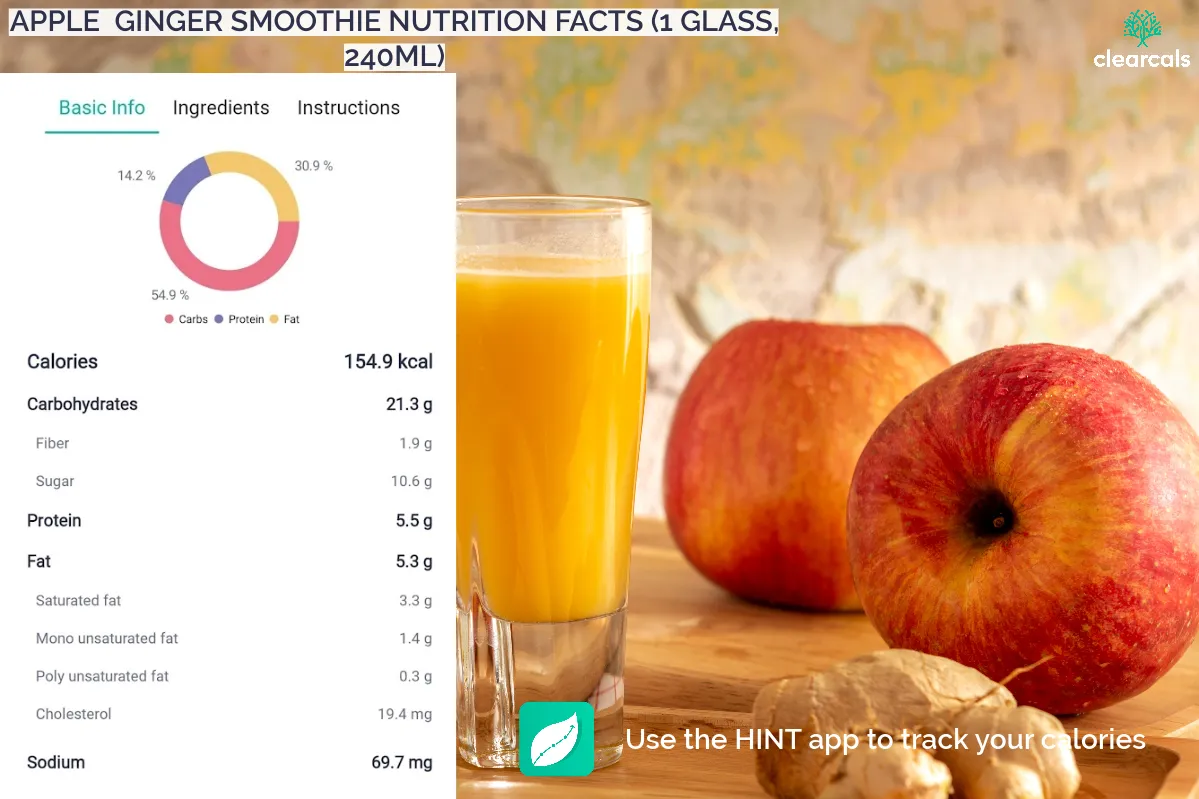
One glass (240 mL) of apple ginger smoothie contains 155 kcal. Out of this, 55 % is from carbohydrates, 14.2 % is from protein, and 30.9 % is from fat.
Apple ginger smoothie is a good source of protein, calcium, phosphorus, riboflavin, and an excellent source of vitamin D, and vitamin B12. It makes a perfect pre-workout meal and aids in weight loss.
6. Spinach Apple Smoothie
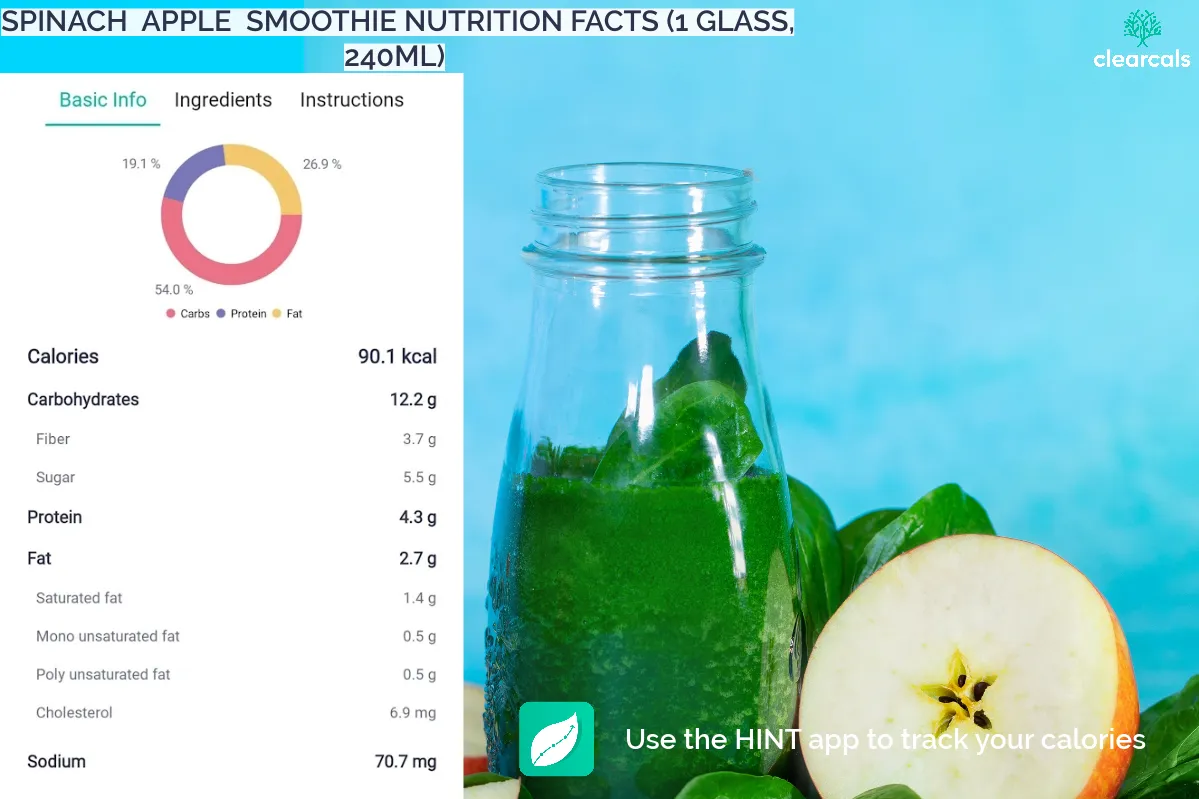
One glass (240 mL) of spinach apple smoothie contains 90 kcal. Out of this, 54% is from carbohydrates, 19.1 % is from protein, and 26.9 % is from fat.
Spinach apple smoothie is an excellent source of vitamins, minerals, fiber, and polyphenols. It helps improve blood glucose levels and boosts immunity
7. Apple Apricot Smoothie
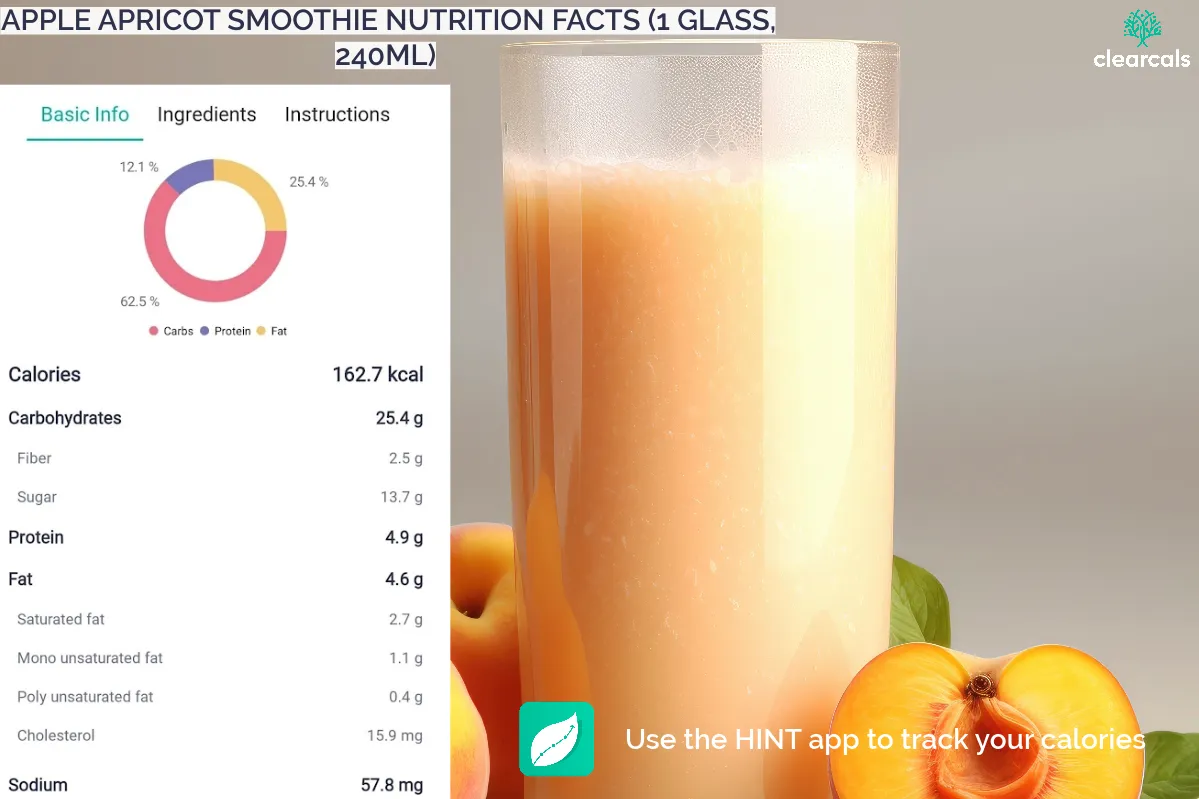
One glass (240 mL) of apple apricot smoothie contains 162.7 kcal. Out of this, 62.5 % is from carbohydrates, 12.1 % is from protein, and 25.4 % is from fat.
Apple apricot smoothie is a good source of protein, potassium, calcium, phosphorus, copper, and an excellent source of vitamin D, and vitamin B12. Drink this beverage in moderation as it contains high sugar.
8. Carrot Apple Ginger Juice
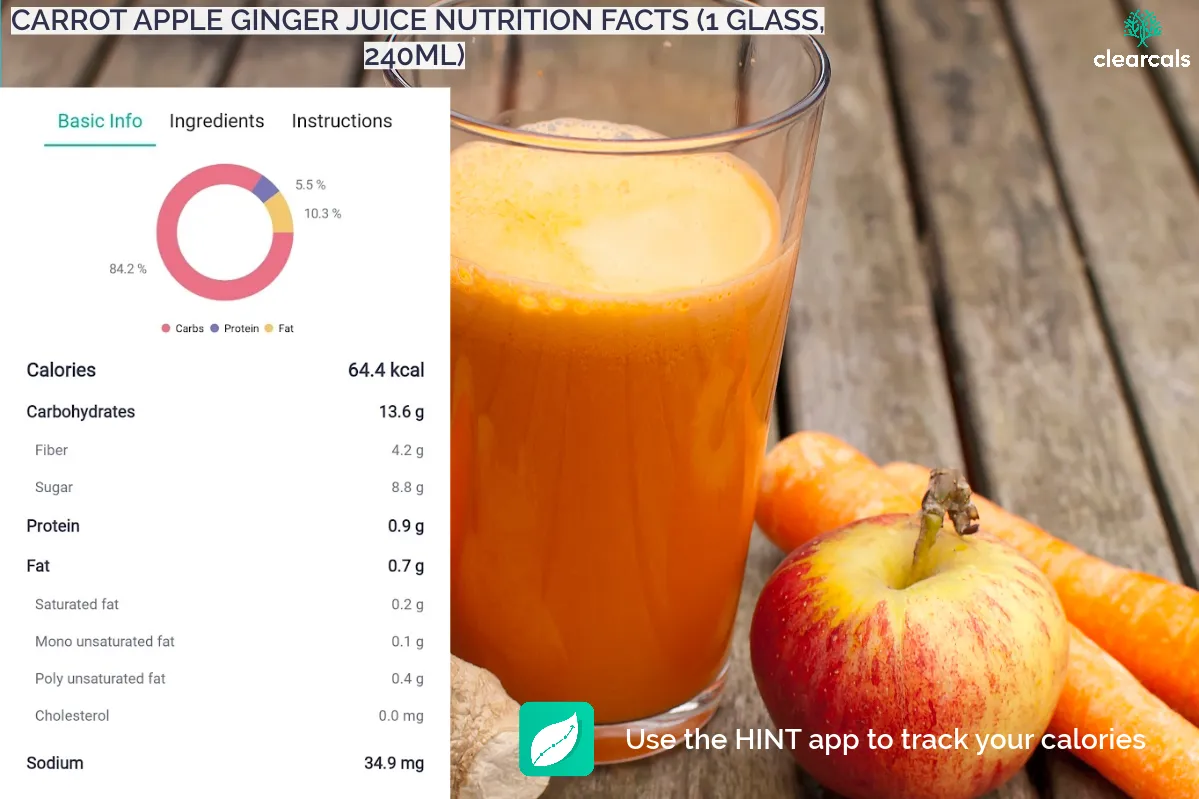
One glass (240 mL) of carrot apple ginger juice contains 64.4 kcal. Out of this, 84.2% is from carbohydrates, 5.5 % is from protein, and 10.3 % is from fat.
Carrot apple ginger juice is a good source of dietary fiber, vitamin C, vitamin D, and an excellent source of beta carotene. It helps detoxify your body and aids in digestion.
9. Cucumber Apple Tomato Salad
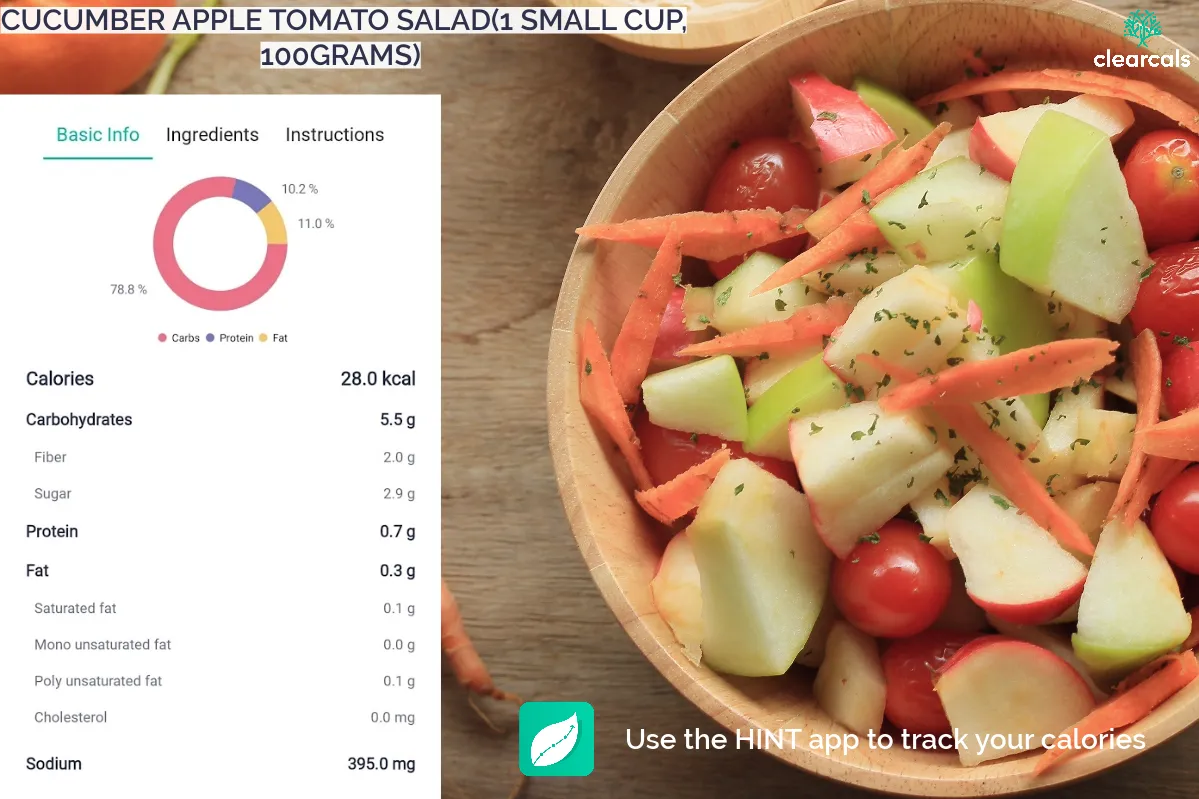
One small cup (100 grams ) of cucumber apple tomato salad contains 28 kcal. Out of this, 78.8 % is from carbohydrates, 10.2 % is from protein, and 11 % is from fat.
Cucumber apple tomato salad is a good source of vitamin C, and an excellent source of vitamin D. It boosts immunity, provides satiety, and aids weight loss.
10. Apple Linseed Porridge
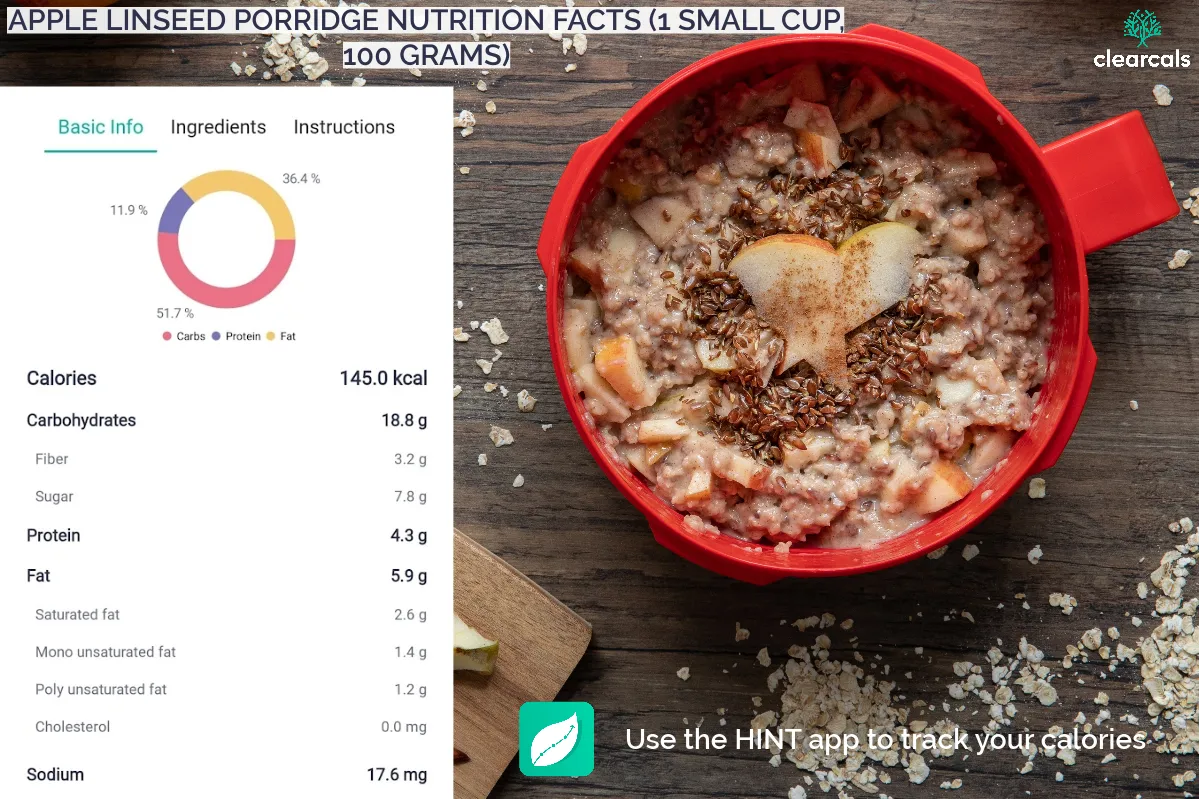
One small cup (100 grams ) of apple linseed porridge contains 145 kcal. Out of this, 51.7% is from carbohydrates, 11.9% is from protein, and 36.4 % is from fat.
Apple and linseed porridge is a good source of dietary fiber, phosphorus, and selenium.

Elevate Your Apple Nutrition with Hint
To make the most of your diet, track your apple calories and overall nutritional intake using the Hint app. With the calorie tracking feature available for free, you can keep tabs on your calorie intake from apples and other foods, helping you stay on track with your nutrition goals.
For those looking to incorporate more structured workouts and nutrition planning, the Pro Workouts feature, accessible with Hint Pro or Hint Premium, offers over 300 strength-training routines, workout tracking, and animation videos.
Plus, Hint Premium users can enjoy unlimited dietitian consultations and personalized diet plans tailored to support fitness and wellness goals.
Conclusion
Apples are more than just a tasty and convenient snack; they’re a powerhouse of nutrients that can greatly benefit your health.
From promoting heart health to aiding in weight management and providing essential antioxidants, apples offer a wide range of advantages.
With the Hint app, you can track your nutritional intake, plan meals, and even access workout routines, making it easier than ever to reach your health goals.
So next time you reach for a snack, consider an apple—a simple, nutritious choice that supports a balanced and healthy life.
Frequently Asked Questions
1. Are apples good for weight loss?
Yes, apples are an excellent choice for weight loss due to their high fiber content, which can help you feel full and reduce overall calorie intake.
2. Do apples help lower cholesterol?
Apples may help lower "bad" LDL cholesterol levels, due to their fiber and antioxidant content, which can contribute to better heart health.
3. Are apple peels more nutritious than the flesh?
Apple peels contain more fiber and certain antioxidants than the flesh, making them a nutritious part of the fruit.
4. Can apples help regulate blood sugar levels?
Apples have a low glycemic index, so they can help stabilize blood sugar levels and are often included in diabetic meal plans.
5. What is the best time to eat an apple?
You can enjoy apples at any time of day, but they make a great, healthy snack between meals.
6. Are there different types of apples, and do they have different nutritional values?
Yes, there are many apple varieties, and while their nutritional values are generally similar, they may vary slightly in taste, texture, and specific nutrient content.
7. Can apples be included in a gluten-free diet?
Yes, apples are naturally gluten-free, making them a safe and healthy choice for those with gluten intolerance or celiac disease.
8. Are organic apples better than conventionally grown apples?
Organic apples are grown without synthetic pesticides or fertilizers, which some people prefer for environmental and health reasons. However, both organic and conventional apples can be part of a healthy diet.
9. How can I incorporate apples into my diet?
Apples can be eaten fresh as a snack, added to salads, oatmeal, or yogurt, and used in baking for pies, crisps, and muffins.
10. Do apples have any potential side effects or allergies?
Apples are generally safe for most people. Some individuals may be allergic to apples, and excessive consumption may lead to digestive discomfort due to their fiber content. It's essential to consume them in moderation.
11. Is apple good for skin?
Yes, apples are good for the skin due to their high vitamin C and antioxidant content, which help fight inflammation and support collagen production.
12. Is apple good for cough?
Apples have mild anti-inflammatory properties, which can be soothing during a cough, helping to keep the throat moist and hydrated.
13. Is it good to eat apple at night?
Yes, eating an apple at night is beneficial as it may support digestion and prevent nighttime hunger due to its fiber content.
14. Is apple good for fever?
Yes, apples are gentle on the stomach and can help maintain hydration, making them a suitable food during a fever.
References
- Asgary S, Rastqar A, Keshvari M. Weight Loss Associated With Consumption of Apples: A Review. J Am Coll Nutr. 2018 Sep-Oct;37(7):627-639.
- Inoue Y, Cormanes L, Yoshimura K, Sano A, Hori Y, Suzuki R, Kanamoto I. Effect of Apple Consumption on Postprandial Blood Glucose Levels in Normal Glucose Tolerance People versus Those with Impaired Glucose Tolerance. Foods. 2022 Jun 19;11(12):1803.
- Sandoval-Ramírez BA, Catalán Ú, Calderón-Pérez L, Companys J, Pla-Pagà L, Ludwig IA, Romero MP, Solà R. The effects and associations of whole-apple intake on diverse cardiovascular risk factors. A narrative review. Crit Rev Food Sci Nutr. 2020;60(22):3862-3875.
- Nezbedova L, McGhie T, Christensen M, Heyes J, Nasef NA, Mehta S. Onco-Preventive and Chemo-Protective Effects of Apple Bioactive Compounds. Nutrients. 2021 Nov 11;13(11):4025.
- Jamal QMS, Khan MI, Alharbi AH, Ahmad V, Yadav BS. Identification of Natural Compounds of the Apple as Inhibitors against Cholinesterase for the Treatment of Alzheimer's Disease: An In Silico Molecular Docking Simulation and ADMET Study. Nutrients. 2023 Mar 24;15(7):1579.





